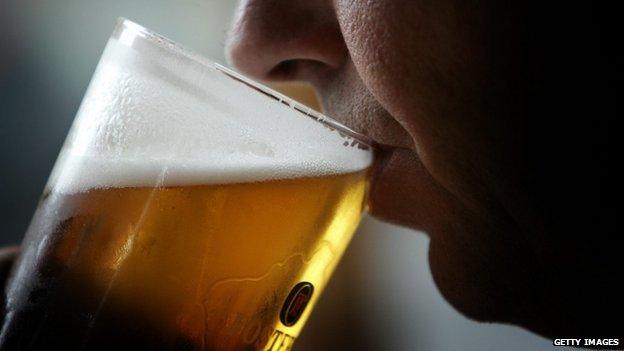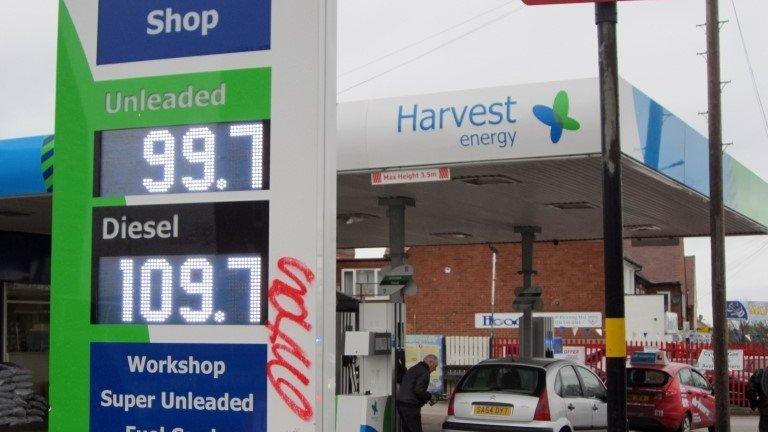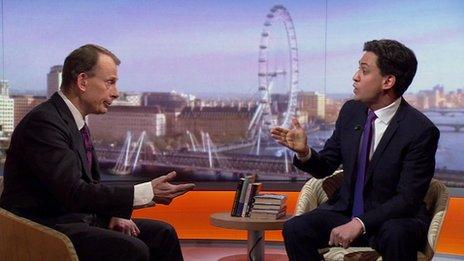Dispute and danger down the Dog and Duck
- Published

Do you go for a "drinking occasion" without a meal? We're told it's a disappearing habit across Britain - other than affluent areas - and that disappearance is accelerating. That's not good for pubs.
Perhaps the projection of an old and endangered image of the bar-propping Englishman is one of the ways in which Nigel Farage seeks to tap into voters' dislike of how the world is changing.
It's probably no surprise that they're blaming supermarkets for selling alcohol much more cheaply.
The chairman of Wetherspoon's, Tim Martin, has updated the market on how his pub chain is faring, with an unusually frank assessment by the standards of stock exchange statements.
He's furious about the tax treatment of on- versus off-sales, and he seems even more furious about the rest of the industry failing to campaign on this.
This is, after all, pre-Budget lobbying season for the drinks industry. The Scotch Whisky Association is on a similar warpath against the tax on spirits, most recently citing the quiet cry of Britain's small distillers, who are keen to innovate.
Blood alcohol
In pub-land, as the Wetherspoon's chairman stares into his pint, he's reporting that rising sales last year went flat around Christmas, and have worsened since then.
Rival pub chain Greene King, earlier this week, put out a trading update which also showed sales going flat, but that was blamed on Scots.
It seems the Police Scotland message - as the lower drink drive limit on blood alcohol was introduced on 5 December - reached home safely. The implied fall in Scots takings for Greene King pubs was around 5%.
Don't worry about Wetherspoon's staying afloat. With an aggressive growth strategy, often turning old halls and banks into pubs, it saw sales growth of 9% in the six months to January 18.
In pubs trading throughout the previous year (like-for-like sales), trade was up 4.6%.
Food-led
Part of the chain's approach is to sell booze with food, at what we might politely call the lower end of the price range.
And according to Tim Martin, pub chains are only investing in "food-led" outlets. "Fewer and fewer customers, outside pockets of affluence, in an accelerating trend, are using pubs for "drinking occasions", which do not involve eating.
"The main reason behind this trend is not that people prefer to drink at home, for example, but relates to the huge and growing price differential between pubs and supermarkets.
"This differential has been created and increased by the fact that business rates per pint are far higher in pubs and that supermarkets pay no VAT in respect of food, whereas pubs pay 20% - enabling supermarkets to subsidise the price of beer and other products."
Tectonic plates
He blasts other pub-cos, and personally lambasts the editor of the publicans' trade journal for failing to support the 'tax equality' campaign, before issuing a dire warning:
"Following chaos at our banks, the supermarkets themselves have recently witnessed a situation where the tectonic plates of the industry moved, even though the boardrooms at the major industry players were oblivious to this fact.
"That is the position now in the pub industry and the companies that do not speak out about the dangers of tax inequality are likely to be those that suffer most in the future".
Dirty laundry
It's worth here noting that the supermarkets were taken aback not only by a customer shift to convenience stores and away from big out-of-town shops, but also by insurgent German competitors, driving down price.
And if there's an equivalent to Aldi or Lidl in the pub business, it is not just the supermarket but the likes of Wetherspoon's.
Another big winner from recent changes in the booze market is the micro-brewery, and their sales are not driven by low prices.
Anyway, Mr Martin's denunciation reads like the industry's dirty laundry getting a good public scrubbing. It's also a cry for help from a sector in a lot of bother.
You may not shed a tear for big business seeing their beer sales going flat. But the future of the Great British pub has a social dimension as well. And maybe a political one.
* What do you think pubs need to survive? I'd be interested to hear about those which are successfully innovating, at business.scotland@bbc.co.uk.
- Published12 January 2015

- Published11 January 2015
